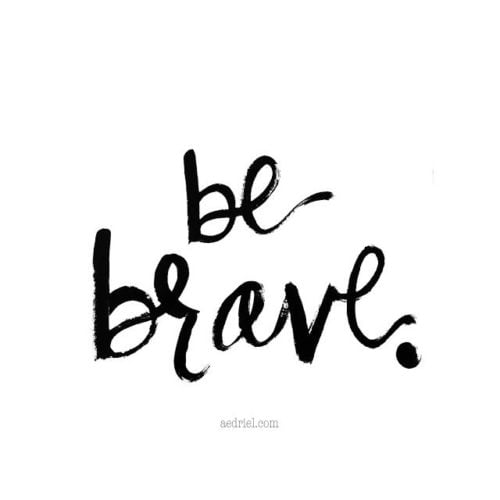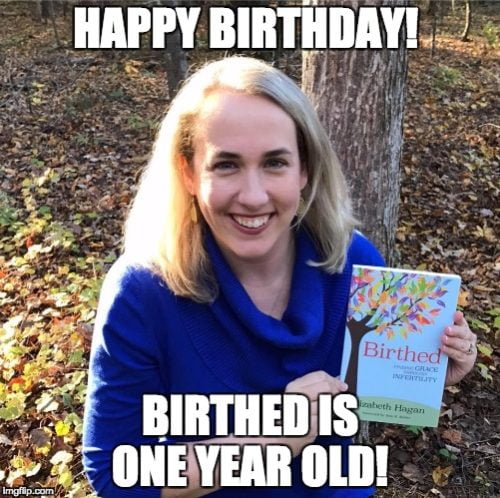 Happy birthday, Birthed! One year ago-- December 6, 2016, my first book was birthed into the world! Oh happy day.
Happy birthday, Birthed! One year ago-- December 6, 2016, my first book was birthed into the world! Oh happy day.
I can remember the emotions of that week so clearly. Friends and family who'd heard me talk about "that book project" for years finally held their hands on a real life copy. All of my worst marriage moments, darkest nights of doubt and depression and failed attempts to get and stay pregnant now belonged to every reader who picked it up-- not just me (a bit scary!) And all the while, I felt jazzed up about marketing and promotion with a strong belief that I could sell books if I gave it my best effort (and I did!).
In the 12 months since that launch, I've lived into what it means to birth and be birthed. Like any watershed moment in life, I've learned so much.
I've learned the best book events happen when you are hosted by those who believe in your words and seek to create experiences for those in their circles of influence. One of my favorite book gatherings happened around this beautiful table in Birmingham, AL at my friend April's house. She even bought each dinner guest of hers a book-- how amazing! 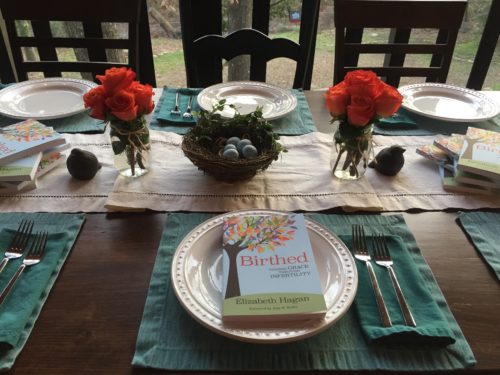 I've learned that infertility is still a topic that we don't want to talk about in our churches, mom's groups or even in our families. I can't tell you how many times I've asked to connect with a church or a group about Birthed and heard, "Oh we can't talk about that here." (Deep sigh).
I've learned that infertility is still a topic that we don't want to talk about in our churches, mom's groups or even in our families. I can't tell you how many times I've asked to connect with a church or a group about Birthed and heard, "Oh we can't talk about that here." (Deep sigh).
I've learned that your book's success is not based on the number of copies you sell (honestly I avoid knowing because I don't want to obsess) but on emails you get from readers who say, "Thank you. Your story is my story. I'm so glad you wrote it." But the truth be told, publishing is HARD and NOT for the faint of heart. There are parts of me that feel really sad about how the book has been received. But I move on.
I've learned that publishing opens up speaking opportunities in the most unexpected places-- like this time this spring I got to speak to a group of Marriage and Family Studies students at Samford University. Who knew that college students and professors would want to talk about my book and plan to use it as required reading? 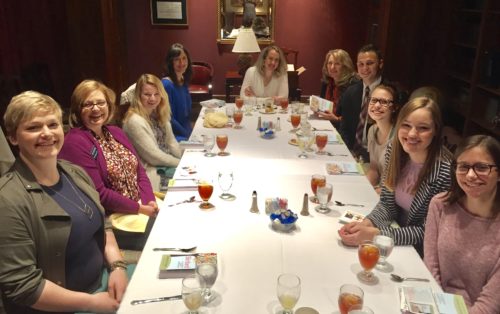
Most of all, I've learned I want to write and publish again. The kind of ministry I was able to do as result of publishing Birthed, (ministry like leading retreats, speaking to groups and hosting round-table heart-to-heart discussions among groups of friends) IS the work I see myself doing long-term.
And this writing more will look like another memoir-- a book on the topic of orphan care and my own journey of adoption-- that I've been drafting since 2015 as well as a spiritual formation resource for congregations (I hope) as a guide on how to talk about other hard topics. So keep hanging with me for the ride. I promise I've got more in me.
But, there's one more thing I need to tell you about this birthing day . . .
It's also the day that we "officially" became parents forevermore to our baby girl. On the day the book about our struggle toward parenthood was published, our adoption was finalized as well. The court just assigned us the date. I don't want to believe this fact is coincidence. Can you feel my goose bumps?
For you see, as much as Birthed: Finding Grace Through Infertility is a story of grief, loss and hope, so is adoption. Adoption is a beautiful and pain-filled occasion all rolled into one. Our girl lost her first family before she became a part of ours. December 6, 2016-- oh the birthing day, you were!
And I wouldn't take anything for my journey now.
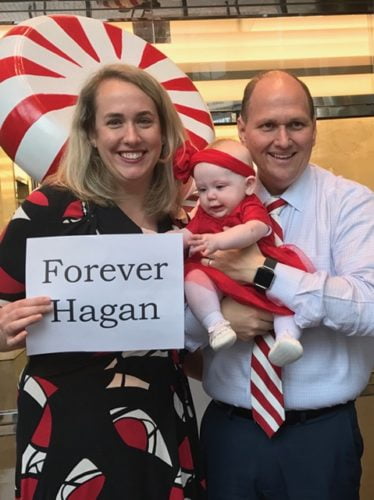
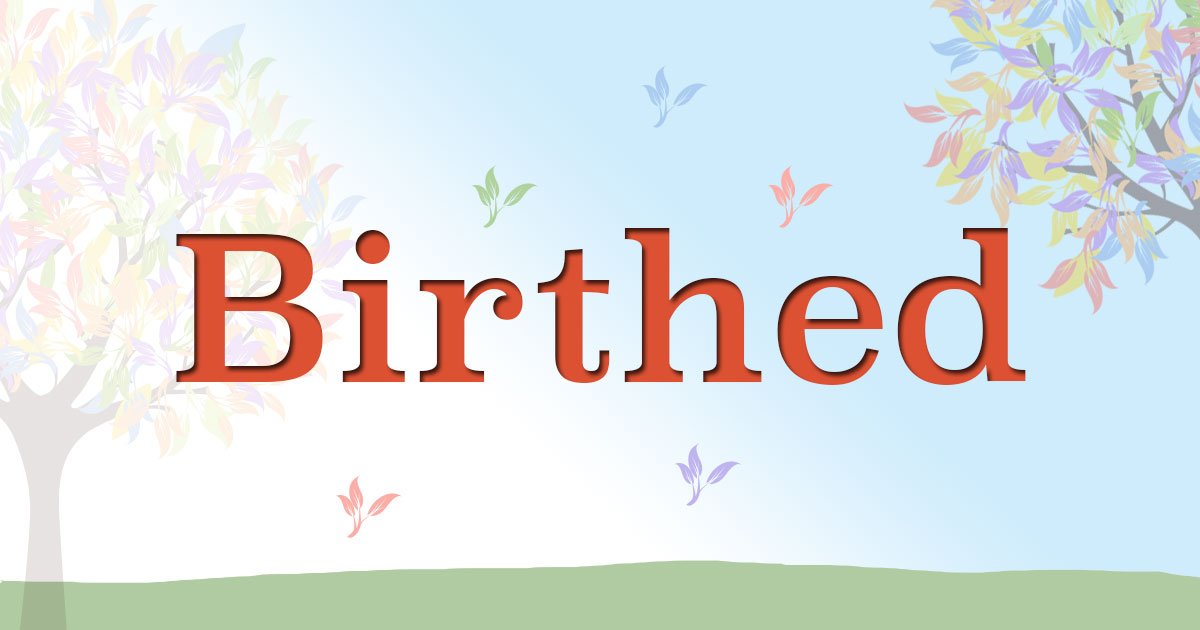
Can anything good come of autism?
As the days of Lent continue, I'm glad in this Birthed series to introduce you to my colleague, Anne who shares her family story. She reminds us that even in the hard places of life, the best surprises are possible!
Our oldest son will be 21 this year! He is the child I birthed at age 39, long after friends and relatives thought my husband and I would never become parents. Surprise! I have discovered how much I resonate with Abraham and Sarah!
In the baptismal liturgy of my tradition, the Evangelical Lutheran Church in America the minister prays these words as a sign of the cross is placed upon the forehead with oil: “Child of God, you have been sealed by the Holy Spirit, and marked with the cross of Christ forever.” Our son was baptized at 3 months and his identity as God’s beloved has always been not only God’s claim upon him, but our conviction as well. “This is my son, the beloved,” God says to Jesus at both his baptism and transfiguration, and God certainly echoed those words on that day for our son.
At the age of 3 we learned he was developmentally delayed. It was determined several years later that he had a form of high functioning autism, called PDD-NOS, Pervasive Developmental Disorder – Not Otherwise Specified.
In the late 1990’s there was not much information about autism. Most school systems in rural areas such as ours had little experience with anyone on the spectrum. In fact, our son was one of the first so diagnosed in our elementary school. That began my years of going to conferences to bring needed information about social skills and advocacy to the school until they grasped the necessity of teachers receiving such training. It began many conversations with those who grasped his needs and those who ignored them.
But this story is about those who rose above expectations, who persevered with our son, who saw him as beloved-- those who recognized and celebrated his quirkiness, his passions, his uniqueness as a beloved child of God.
What my son's autism has birthed in me is gratitude for the love around all our lives.
Thank you from the depths of my heart. For you have been the light of Christ shining in the darkness of those who fear, judge, dismiss, or condemn. In your giving, you have restored for me the reality of a gracious God who loves everyone. For God so loves the world, Jesus tells us in the Gospel of John. Not those who are the same, not those we believe deserve it, but everyone. Especially those who we in our human limitations and brokenness cannot even imagine God naming beloved! But the wondrous good news is this: everyone is a recipient of this overwhelming, generous, healing love rooted in the death and resurrection of Jesus Christ.
I can't help but mention a few of them.
Thank you, Matthew! We adopted you into our family at birth and you have been a steady, sure presence in our lives. You brought your giggles and love of life to Adam and have been an advocate and friend even when it was hard to do so. As the youngest you have diligently challenged, provoked, and tested your older brother, all to his benefit!
Thank you, Tasha, Nathanael, and Brian! Your families were the ones who extended invitations to those early school age parties. By your inclusion, by your acceptance and hospitality, I saw the Christ who welcomed the marginalized and outcast.
Thank you, Jamie! As a teacher you saw beyond the label of “special needs” and believed, encouraged, and advocated. Your vocation is a blessing, a gift of God.
Thank you, Ann! You were a special 4-H leader. You invited our son to participate, loved his quirkiness, and taught him to sew and cook, receive his first awards, and most of all, belong to a group.
Thank you to Diane, Jen, Paula and Miriam! Sunday School teachers extraordinaire! You invited, included, and rejoiced in his participation in the life of the church. You lived out the promise of Romans 12:6 - We have gifts that differ according to the grace given to us.
Thank you, Robin, master of social skills! You pursued your passion to help students on the spectrum grow and mature and learn to communicate with others. Your self- sacrifice gave new life to our son.
Thank you, scholarship committee. You recognized our son’s love of history and awarded him! The beaming smile he displayed that night was a sign of pure joy. It is etched in my memory and my heart forever.
Thank you, Dave. As a college advocate for those who learn differently, you encourage and support with patience and kindness. Thank you for being there. Thank you for giving hope and confidence to our son.
Thank you to all who think outside of the box.
Thank you to all who recognize the gifts which lie beneath the surface of who we are.
Thank you to those who recognize the Christ in others.
And thank you to the medical staff w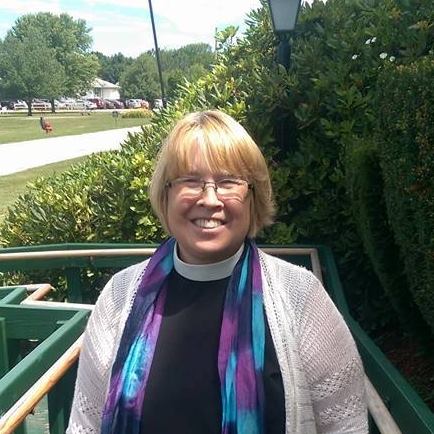 ho helped me birth this beloved one of God, after 40 hours of labor and an emergency C-section. Born with a beating heart but needing to be resuscitated, you helped breathe the breath of God, the breath of life into his sturdy 9 lb. 6 oz body.
ho helped me birth this beloved one of God, after 40 hours of labor and an emergency C-section. Born with a beating heart but needing to be resuscitated, you helped breathe the breath of God, the breath of life into his sturdy 9 lb. 6 oz body.
Adam, child of the earth, beloved of God, happy 21st birthday!
And thank you, God of all creation, for you continue to birth new life in us. Your Spirit is alive in our midst as you tend to your beloved. And we are the blessed recipients of your love. Thank you for all that has been, and for all that is to come. To you be all blessing and honor and glory and might, now and forever. Amen
Rev. Anne Roser is a mother, wife, sister to 5 younger brothers, daughter, gardener, music lover, and Lutheran pastor. At the age of 2, with her parents, she immigrated to the US in 1959 from Sweden. Ordained in 1985 in what is now the ELCA she serves currently as an intentional interim pastor in Portland, Maine. She lives in the mountains of New Hampshire with her family and Rocky the gecko, Mandy the cat, and Ben the dog, as well as all the wild animals of God’s wonderful creation (deer, moose, coyotes, lynx, bear, etc.) in the woods around her home.
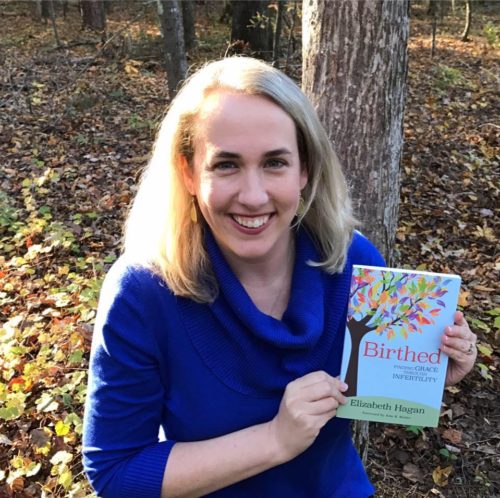 Since I first drafted what became Birthed: Finding Grace Through Infertility back in 2013, I've been on a journey of learning about publishing.
Since I first drafted what became Birthed: Finding Grace Through Infertility back in 2013, I've been on a journey of learning about publishing.
How does it work? What are the secrets (if any) to success? What are the best choices to make as a first time author?
As much as friends or colleagues offer you advice, until you go through the publishing once there are just some aspects of the business you can't understand.
Today, I want to share 5 misconceptions that I've learned through this process:
1.Publication will make you feel like a "real" writer.
I meet folks all the time now who want to talk to me about their idea for publishing a book.
Most of the time, they're good ideas, inspired ideas, the makings of books I'd love to read one day. These folks are serious too. They've drafted chapters. They've written outlines. They're even beginning to think about their target audience and crafting their narrative in that direction.
BUT, they say, "I can't find anyone to publish it." And they look so sad.
Because here's the thing. Writers often equate publication with success. Validation comes with someone "out there" saying our ideas are worthy enough to bind in a book.
Hear me say this, since publishing Birthed, I feel the same as I did pre-Birthed. I continue to blog like I always do. I write for other publications regularly as before. While I'm so glad my memoir was published, I really don't feel like I've suddenly arrived as a writer. I was just taking the next step of who I already was.
(If you have a good idea and completed book-- self-publication is not a bad idea! Don't let publishers define your worth. Go for it!)
2. You make money writing books.
If you go into writing books for the money, be prepared to live on food stamps. Of course, the big box publisher situation is different. But in small publisher land, there's no advances or if there is one it's very small. Additionally, know this: the standard publishing arrangement of what you receive per book you sell is somewhere in the range of $1 a book. Yes, you read me correctly. $1.
When I think about the hours that it takes to produce a quality project-- all of the revising, re-writing and painful meetings with editors, what you're getting is pennies on the hour if that.
This fact can be deflating, but if you're not in it for the money it doesn't feel so bad. My husband always jokes with me when I complain that I'm getting "stars in my crown" since I say that writing is part of my faith calling....
As an aside, be nice to your writing friends-- be willing to pay for their work. Don't expect you'll give them a copy for free. How would you feel about giving away your art for pennies?
3. When your book comes out, publishers send you on a book tour.
Publishers, especially small ones, send you nowhere. It's all you. You organize everything.
Folks have noticed that I've been busy though the past couple of months hosting book signings and events at churches talking about Birthed. Note: all of these engagements I arranged. Many of them came from personal asks. Emails that began like, "Hey, I just published a book, I'd love to come to ...." Others came from invitations of those already invested in my work because they edited drafts or endorsed it. Or mentors who followed my journey and wanted to support me.
Bottom line if you want to have a "book tour" in times like this draw upon your personal connections-- people who will make meaningful events for you happen. If you want to talk to me about visiting you, check out my schedule and send me a message! (See, I'm always looking for ways to make an ask).
4. The more live events you have the more successful your book becomes.
Seems logical, right? Events sell books. So events are good.
Events are good if you enjoy meeting people (which I do!). But books don't always sell at events. Amazon and e-books are powerful pulls especially when you've written a book about a topic that brings people shame, like infertility. Folks want to buy books like these from the comfort of their home.
Furthermore, if you talked to a crowd say of 100, the standard fundraising stats are that 3-5% of those present will respond. Yet, for example, I spoke to a church a couple of weeks ago of about 100 and sold 10 books. I was thrilled. It was great return (though doesn't seem like a lot) than normal.
It's important to mention here that events are costly to put together. You often have to spend money to drive or fly somewhere. You have to stay somewhere. All of this adds up (unless a group is supporting you).
Instead, what IS helpful for marketing though is big name endorsers-- writers/ speakers/ leaders with a bigger platform than you willing to put their nose out and say, "This is a great read because . . . "
5. People will be as excited about your book as you are. 
They won't, sadly. Though of course, some will like your mom . . .
It's important to realize that you've invested so much of your life in every word of your manuscript. You've painfully made the choice over verb tense, chapter headings and what type of table of contents you'll have. You've mulled over the title of the book, the cover design and how to word the description of yourself on the back.
And while you're proud of what you've pulled together (and you should be), just don't expect others to be invested in the details as you have. (Do you hear how many time I've used the word "you?"). It's your baby and as you send it out into world, it's time to let go. Others will respond as they will.
Those who care will surprise you. Those who ignore it will surprise you even more. But, by time you've reached publication, again I'll say it's not yours. Let it be. It will do what it needs to do without you worrying about it so much.
All in all I'm so thankful I published my first book and I hope my publishing career isn't over. I know I have more books in me. And if you have a book in you, let's talk off line. I'm know I have so much more to learn. I want to learn from you.

Could sudden loss of a job birth anything good?
Today, I'm glad to introduce you to my friend, Amy. Amy and I met as freshmen in college and hung together for the next four years as part of a small group, choir and all other sorts of shenanigans. Now we both have daughters named Amelia. She's got a beautiful story of redemption to share, so I know you'll want to keep reading!
When I stood on the steps of my freshman dorm building at Samford University in the fall of 1998, my mom handed me a card, gave me one last hug, cried and drove away. I went up to my room on the fourth floor and opened the envelope. It was a store-bought postcard with a beautiful rainbow photo. The verse Jeremiah 29:11 was printed on the front.
For I know the plans I have for you,” declares the Lord, “plans to prosper you and not to harm you, plans to give you hope and a future.
It’s a common verse to give to young college students, and my mother was kindly reminding me that the next four years would bring a lot of change, but that God’s plans were always for my good.
Fast forward fourteen years to 2012. I’m married and have two young children, a home and a thriving career. I work a nursing management job, a position that is meant for someone much older and more experienced than I.
I never imagined that I’d be a working mom, but never less, I grew to love my work and enjoyed the fast-pace of our facility.
If you had asked me in early 2012 about Jeremiah 29:11 and the prosperous plans God had for me, I would have said with certainty that this was it.
I was the primary breadwinner for our home, and my husband had started a new graduate school program to earn a degree he’d desired for years.
I had committed to working the next three years for him to finish school and then we’d transition breadwinner status. That was the plan, so we thought.
And then, it all came to a screeching halt and changed within a matter moments.
Through the work-related traumatic loss of two people — one a patient, one a co-worker — I was no longer able to work as a nurse. Suddenly, all of my college education, career experience, professional license and income source was no longer valuable. The grief was too much to bear and I was incapable of donning my scrubs and hanging a stethoscope around my neck. I questioned how God’s plans to prosper me could still be true after such tragedy.
I had promised to support our family, and my husband was required to work an unpaid internship in addition to classes, which left him little time for a part-time job. I was desperate to find a way to support my family, but knew it couldn’t be nursing.
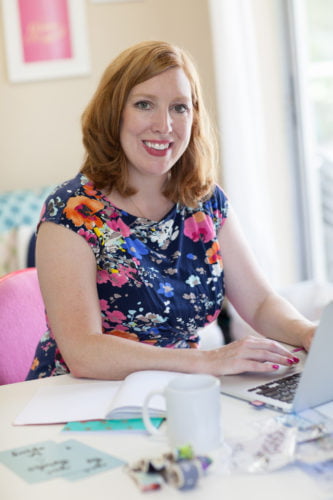 Deep inside me was a rich history of seamstresses. As a little girl, I sat with my Grandma, Granny and Mom and learned to sew.
Deep inside me was a rich history of seamstresses. As a little girl, I sat with my Grandma, Granny and Mom and learned to sew.
I have fond memories of sewing for hours on end during summers and Christmas breaks. I always imagined the day when I would create things people wanted to buy. This dream was long buried under emotion, day-to-day life, marriage and kids. However, somehow in the thickness of mourning, I began to hope in this dream once again.
As a way to take my mind off of the sadness and loss, I began sewing again.
A dear friend saw potential and suggested I start selling online. I asked my husband to “borrow” $50 from our checking account so I could start with the smallest amount of inventory.
I created the LippyClipTM, a clip-on lip balm holder designed to hold products like Chapstick, Burt’s Bees, etc. I remember thinking to myself, “This will never sell. This is such a first-world product. I mean, who would buy this?!?!”
I also remember praying, “God, you can do all things. I know You always have my good in mind. Please, let this work.”
In the summer of 2013, I started small and slow, but was quickly met with a high demand for products and nothing but growth for the business. In the months and years that followed, the business grew and exceeded all of my expectations and goals.
I couldn’t keep up with production, so I made the very intentional decision to grow the business as large as God allows, with the purpose of providing work for as many women as possible. These are women who, for the most part, are otherwise unable to work outside their home. Today, we provide supplemental income to seven women.
My husband graduated with a master’s in counseling and is now a licensed mental health counselor. He works full time in private practice and loves his job.
I’m so grateful for the knowledge of sewing that my grandmothers gave me, and the management skills I learned from years of nursing — both of which I use every day in my business. I’m grateful for the LippyClipTM, which is a first-world product, but symbolizes to me God’s sweet mercy to our family during my dark hour.
I’m grateful for the journey that birthed in me a new direction and prosperous future.
Amy Gabriel is the founder and creative director of Gabriel’s Good TidingsTM, which creates beautiful handmade products to help women find essentials easier and brighten their space. She’s committed to keeping all products made in the USA by women working from home. When Amy is not working, she enjoys beach days, watching college football, swimming and reading. She resides in Orlando, Florida.

What can depression or anxiety birth in your life? Can anything good come from it?
Today, I'm glad to introduce to you Mary Kate, someone I've met online and admired her honesty and commitment to her family for awhile. She shares a brave story today of living with depression and anxiety, something I've struggled with as well and wrote about in Birthed. Write on, warrior sister!
I spent the first several weeks in my first full-time job in a field I was extremely passionate about trying to figure out ways just to make it until 3:15 PM until I could go home and sleep or cry or dread going in the next day to do it all over again.
This is what happens when depression and anxiety take over your life.
I had a 30-minute commute to one of the schools in which I taught music in our rural, mountainous NC county. So much beautiful scenery surrounded me the 2 days a week that I traveled to that tiny K-8 school. But, more often than not, other thoughts clouded my mind’s eye and prevented me from seeing God’s handiwork. One thought occurred more frequently than others: “If I just got into a small accident, I wouldn’t have to go to work. Not enough to die, just enough to break an arm or a leg.”
The other three days a week, I worked at a school much closer to home. This school was much more affluent. As is unfortunately and often the case, with affluence came a feeling of “we just don’t talk about it.” As if we pretended a problem didn’t exist, it would in fact cease to exist. I tried that mindset too. It didn’t work for me. But, I knew, beyond a shadow of a doubt, that I was called to be a teacher, but I was paralyzed in my depression and anxiety.
I could not see beyond the gut-wrenching dread that shrouded my everyday life . . . until a bomb threat changed everything.
For many, this may seem like it would be the metaphorical straw and I the metaphorical camel. But in a supreme twist of irony, on this day, I could see past everyone else’s anxiety and truly find my calling once again.
Early in the morning, I showed up to work. I sat at my desk before the bell rang trying to take some deep breaths and stop any tears from falling before a brief planning period and then my first class of first graders 25 minutes later. I heard the intercom click on and the principal say, “Teachers. We are executing our evacuation procedure.”
I was a first-year teacher. It was the first few weeks of school. I figured this was a scheduled drill that I had ignored during staff meeting. I looked out my door and saw several teachers scurrying even more hurriedly than normal. I then figured out that this wasn’t routine. I grabbed my phone and my keys, went to the bus parking lot and asked the Assistant Principal what I needed to do. She instructed me to board the bus with 50 precious kindergarteners.
These little 4 and 5 year olds were just like me in that moment.
We had only been in school a few days. We had no idea what was going on. We were scared. But I was the adult. I turned around with a smile on my face and stared straight into the wet eyes of those innocent little kids and tried to keep them occupied by asking what their favorite part of school had been so far.
We were evacuated to a local church where, as the music teacher, it became my responsibility to entertain 300 children by singing songs and dancing and playing games. (File under: things they don’t teach you in education classes.) In those 3 hours, I found a confidence in myself that I had lost.
I faced this fact: depression and anxiety had gotten the best of me – and that is easy to do.
Depression and anxiety are real and scary and life-altering. Depression and anxiety are not something we “just don’t talk about” and hope they improve. But when we work through them, wrestle with them, take meds to treat them, see a counselor to talk about them, or whatever coping mechanism you may decide to employ, they can give birth to something greater - newfound experience after traveling through the valley of the shadows.
At the end of the year, I attended a celebratory luncheon with fellow beginning teachers and our mentors. One of our tasks that day was to fill out a few sticky notes with words of encouragement for the next year’s first year tea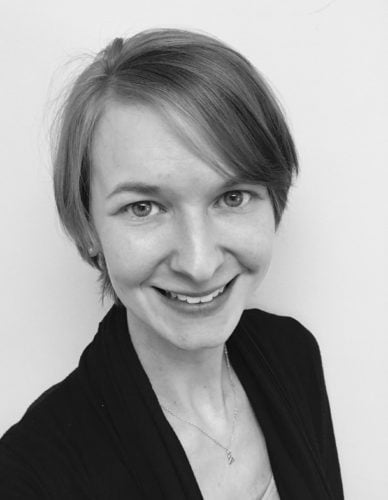 chers. I sat beside one of my colleagues and after writing “It does get better” on my sticky note, I explained how I used to wish I’d get in a wreck to break my arm or leg or something minor. She looked at me and, with a little smirk, said, “I did that too.”
chers. I sat beside one of my colleagues and after writing “It does get better” on my sticky note, I explained how I used to wish I’d get in a wreck to break my arm or leg or something minor. She looked at me and, with a little smirk, said, “I did that too.”
I wish I had known sooner.
Speak up. Speak out. You are not alone when depression and anxiety seem to be your only companions.
It does get better.
Mary Kate Deal is the Parish Administrator at the Episcopal Church of the Redeemer near Richmond, VA. She has a Masters of Arts in Christian Ministry from McAfee School of Theology where she met and convinced a stunningly handsome man to be her husband and partner in ministry for life. She and William have twin 14-month-old girls, Adeline and Dorothy, and two dogs, Boomer and Jasper. She is passionate about writing and preaching and is thankful for any opportunity to do either.

Can anything good come from divorce?
Today my dear friend, Alice joins the Birthed conversation that I'm picking up again this Lent. (If you missed the Advent series you can start reading here). I'm so glad to share Alice's hard earned wisdom today. I know you'll find it as moving as I did, no matter if divorce is a part of your story or not.
“You never really expect bad things to happen you. Well, maybe some bad things . . . but not really bad things.” That’s how Elizabeth Hagan begins Birthed, her memoir about infertility and the blessings that eventually came into her life following so much heartache.
In my own life, the unexpected “really bad thing” was divorce. It shattered my life not once but twice.
First came my parents’ divorce, when I was sixteen years old. As if being a teenager wasn’t hard enough! I did not welcome this catastrophe into my life. I didn’t want to hear their arguments. I didn’t want them to hate each other. I didn’t want them to find other partners. I didn’t even want them to comfort me. I just wanted to escape the whole situation, including my own feelings of sadness and shame. How could they do this to me?
This unhappy experience did not stop me from getting married in my twenties and plunging immediately into parenthood. Even as I carried so much negative baggage from my childhood, I was convinced that I would never inflict this heartache on my children.
I was in for a humbling surprise.
Despite my determination to make the marriage work—and to spare my children of ever having to feel the pain that I had felt as a child—my marriage fell apart, and I was powerless to save it.
And so began a dark and stressful time in my adult life. I could write a long, long book about all that went wrong during that time. I could give you all the reasons why my marriage was unsalvageable. I could cast myself as the heroine of the story, the one who endured injustices and who fought to protect our two boys. But that’s not the story that really matters.
One afternoon, during the early days of our marriage meltdown, my ex-husband and I were sitting in the living room—a room that soon would no longer be ours to share—engaged in one of our many unpleasant disputes. As we sat on the couch, facing each other awkwardly, he said to me point blank, “You are a very unhappy person.”
Now, I could have taken that statement very badly. I suspect that in the moment I didn’t take it well, though I don’t remember for sure. But for whatever reason—I choose to think of it as the grace of God—the observation stuck with me. It was like a gnawing and persistent toothache. I couldn’t get rid of it. I couldn’t shrug it off because, deep down, I knew he was right. He might have been my worst enemy at the time (and I’m afraid I was his too), but he also knew me better than anybody else did.
Here’s the truth: I was unhappy.
Yes, I was good at putting on a cheerful front with my friends and coworkers. Sometimes I even managed to fool myself. If I acted like a happy person, didn’t that mean I was happy? But I wasn’t enjoying my life. And now that my ex was bowing out as my life partner, I couldn’t blame it on him.
In her book When Things Fall Apart, Buddhist nun Pema Chödrön writes about the end of her own marriage years ago. She recounts the moment when she learned of her husband’s infidelity, when “my whole reality gave out on me.” She writes about losing her sense of security and about how this opened her soul wide open. She couldn’t fool herself any longer: “instinctively I knew that annihilation of my old dependent, clinging self was the only way to go.” As human beings we tend to cling to the idea that if only the people closest to us—maybe a parent or spouse or boss—would change, our problems would end. It doesn’t work that way, though, and my own life had to fall apart for me to finally recognize this truth.
How had I let happiness slip from my grasp? How had parenthood, so eagerly longed for, become an anxiety-ridden burden instead of a joy? Why weren’t my boys and I having fun together? Why had I stopped listening to my favorite music? Or laughing?
As I began to seek answers to these questions, a season of recovery began for me.
It was time to accept responsibility for my own happiness. Step by step, I began to do just that, consciously letting go of bitterness and blame. “Let it begin with me” became my personal mantra, and it remains so to this day. I never w
anted divorce in my life. But I also never expected the joy that would burst forth—as soon as I was willing to claim it—after such sadness and pain.
![]() Alice Stanton is freelance book editor. For more than two decades she worked as a manuscript editor for the University of Oklahoma Press. A native of New York City, she currently resides in Weatherford, Oklahoma.
Alice Stanton is freelance book editor. For more than two decades she worked as a manuscript editor for the University of Oklahoma Press. A native of New York City, she currently resides in Weatherford, Oklahoma.
 We can easily spend our days living in labels. There are the labels others give us.
We can easily spend our days living in labels. There are the labels others give us.
Overweight. Social Butterfly. Photogenic.
Labels we place on ourselves.
Determined. Hard working. A Failure.
Labels that have everything to do with what we believe about our worthlessness.
C student. Second string. Not partner material.
Meet someone new at a party and you'll be asked (especially if you live in my area) is "What do you do?" And what follows is an exchange of labels.
I'm a doctor. . .
I'm a runner . . .
I'm a stay at home dad . ..
Or whatever the case may be.
I've often walked away from conversations like this either feeling very accomplished or defeated depending on who is standing on the other side. I realize such emotions have everything to do with my love of labels. Being known as a particular kind of person who does particular kind of things-- it all goes back to labels.
In my book Birthed, I write about my struggle with the label mother. After years and years of open-minded efforts, I could not get what I wanted. It tortured me EVERY DAY. In the grocery store line, the dry cleaners, or a small group meeting when asked about my children I'd always say:
"No, I'm not a mother."
It felt so unfair after all that I was putting my body through to reach my goal. . . . What did I do to make God so mad at me?
But as I dealt with the pain and wise teachers showed up to lead me to greener pastures, I began taking on this loaded label. I was a mother. I was not excluded. God did not hate me. The only difference between me and the moms clubs: I was not on a non-traditional path.
For, who says that motherhood has to look a certain way?
Who says that the "real" mothers are only those who regularly change diapers or pack school lunches or sign school permission slips?
Who says that you can't nurture hearts and have a full home of family without birth certificates to go along with it?
Motherhood, in my case, just had to be re-packaged.
Now, when people hear that we have a child with our legal last name, most say: “You must be so happy! You’re finally a parent.” But I cringe. For this not how I feel about my journey of parenthood at all.
While I love our daughter and am so glad she's a part of our home, I became a mother long before her birth.
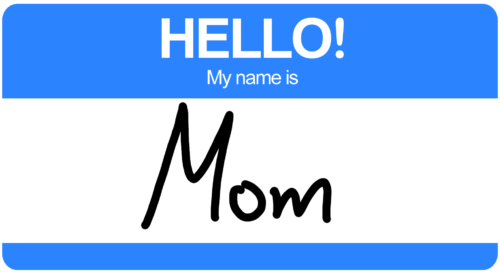
I was a mother to those who embryos that lived in me but did not make it to full-term.
I am a mother to those who find themselves in my congregations or friendship circles— adults and children a like.
And I mother those who I've met in orphanages around the world especially as our family journey intersected with the organization Feed the Children (while my husband was the CEO). Now, it’s a work I continue through the foundation, Our Courageous Kids and the unofficially adopted children that are a part of our lives. (And I hope more to come!).
So when my daughter came I knew she was not "an answer" but the addition to a full life. It's how we parent her now, looking forward to introducing her to many siblings from all over the world.
My soul care word of the day is this: if there's a label you're longing to be used about you, take it on.
Who says you have to be a size 2 to be beautiful? Or a pro-golfer to be a champion? Or an a published author, songwriter or playwright to be creative?
Re-define your longings. Live them out. Be willing for them to take a path you might not have expected.
Who really needs to be normal after all? It's so boring.

During these weeks of Advent, I’m thrilled to offer you the voices of some articulate storytellers— storytellers with wisdom to share about how their experiences of pain or loss is birthing in them something beautiful. Not in a Pollyanna sort of way of course, but in the spirit of what Leonard Cohen once wrote: “There is a crack in everything. That’s how the light gets in.”
Isn’t Advent is all about light shinning in the darkness?
I'm thankful for last week's post from Meredith Holladay. Today my friend Mary Wright Baylor-- who I met on twitter several years ago and recently discovered we were not to distant neighbors (how fun!)-- shares her poignant story of waiting in hope for better days to come.
--------------------------
Of all the seasons, fall is my least favorite.
With a July birthday, I adore summer.
I love the hot sun and heat, outdoor concerts, and fresh herbs in the garden.
As a child, I spent hours in the pool or ocean waves; I relished the freedom of summer and dreaded the return to wearing shoes and homework.
Later, as a young mother, the start of school continued to be a challenge; I missed my children and resisted the structure of homework and afterschool activities.
As a gardener, I find it melancholy to witness the end of the growing season, the harvest of flowers and herbs, the dropping leaves, and frostbitten blossoms. The shorter days and longer nights of fall take its toll on my energy and mood.
So, it was in this season in 2009, that I received a phone call that forever changed my life.
My sister-in-law called to tell me that her husband-my younger brother and the father of four-had tragically ended his own life. Totally devastated, I was overwhelmed to also hear “We need you to go tell your mom and dad.”
“Dear God in Heaven, how can I do that?”
I panicked that this shocking news would kill my elderly parents.
How could I ever tell my father, already frail from Parkinson’s disease and my mother, weakened by heart ailments, that their oldest son had died by his own means?
As darkness fell that September day, my husband drove me over to my childhood home.
I fervently prayed for God to be present, to give me strength, and to give me the language to break such horrific news. In reflection, I really don’t remember much of what happened the rest of that horrible night. Somehow, we managed our raw anguish and survived his memorial service. As we departed the church, I remember that the trees were turning color and the skies were filled with birds migrating.
Following this heart wrenching death, my father was markedly weaker and his Parkinson’s disease worsened.
In October, he was hospitalized twice for respiratory complications. As the daylight hours grew ever shorter, it was clear that his time with us was also drawing nigh.
On Christmas Eve, right after awakening from a nap, he suddenly stopped breathing. He could not be revived. With Christmas carols playing on the radio by his bedside, we surrounded our precious dad resting in peace.
Two deaths in three months. “Oh, God, give me strength! I cannot do this!” But somehow, I did.
On a frigid cold day in early January, I held my mother closely as the wind whipped in our faces and my father’s ashes were interred next to my brother’s.
My memories of the next couple of years are a gray blur.
Though working as a parish nurse, I focused all my energy on my mother. Always incredibly resilient and fortified by her deep faith, she was determined to live as fully as she could.
She continued to volunteer at church, to host family gatherings for holidays, and to join me on many outings. I remember taking her on a late summer day trip to the country. We commented that the fields of corn were drying up at the end of the season. Shortly after that, in early fall, her heart began to fail. As the days shortened and nights grew long, we took multiple trips to the emergency room. Hospitalizations kept me at her side. Though debilitated and homebound, my mother still enjoyed visits from her friends and delighted in time with my grown children. She was elated to learn that my oldest daughter, after several miscarriages, was nearing the end of her first trimester.
As fall progressed, my mother’s decline was marked and soon she was ready for home hospice care.
On a crystal clear November 14, while my remaining two brothers and I held her hands and sang “Amazing Grace,” my mother died very peacefully in her own bed.
With her death, my brothers and I had lost half of our family in three years. “Oh, God, what more do we have to endure?” How could we possibly write another obituary or plan another memorial service?
I was physically exhausted from caregiving for so long. But again, somehow, we found strength and we rallied. The date of her funeral was scheduled for the first Saturday in December on the first weekend of Advent. We thought our mother who loved the rituals of Advent would like that.
On the day before my mother’s service, my pregnant daughter called in great distress.
She had just left a routine ultrasound in which it was discovered that her baby had died in utero. I spent that day, waiting with my son-in-law in the lobby of the hospital as our dreams of our small bundle of new life ended. “How long, oh Lord, how long???”
I remember the dark, bitter cold of that winter. Numbness alternated with despair. How would I ever feel normal again?
Would I ever experience joy? How could I resume “life?” In the months that followed, I simply put one foot in front of the other. I struggled with my faith. “God, where are you?”
I didn’t know what to do other than to heed the psalmist and “to lift up mine eyes unto the hills.” Seasons passed.
And then, slowly and subtly, when I looked up, I began to notice. I noticed glorious sunsets and shooting stars. I heard the beating of a hummingbird hovering over flower blossoms.
I savored fresh basil and inhaled the fragrance of lavender in my garden.
God WAS present.
There was no Hallelujah chorus or trumpet tune. But there were clear signs of God’s omnipresence. By witnessing God at work, I began to heal. Indeed, I began to treasure time with friends and trips with my loving husband. I savored outdoor concerts in the summer and felt peace as waves lapped on the beach.
In this autumn of 2016, I was energized by clearing the bedraggled garden beds and making plans for new gardens next spring.
Perhaps for the first time, I thought that the changing tree colors were particularly vivid and brilliant. Walking our dogs in warm sun and then snuggling by a fire in the evening was cozy. Almost imperceptibly, I recognized that I was not dreading the pending anniversary dates of my family members’ deaths—rather, I felt a sense of peace and serenity.
With a distinct sense of God’s presence, I was not the least bit surprised when on the 4th anniversary of my mother’s death, on November 14, my daughter gave birth to a healthy little girl.
As my tiny granddaughter sleeps, I notice the rhythm of her breathing and feel the fuzz on her little head.
This is Advent. I know that God IS always present. Our cries ARE heard and they ARE answered. And as we are promised, new life WILL come.
After an incredibly fulfilling career in multiple roles and settings in nursing, Mary recently retired (again) as the pastoral care nurse at the Washington National Cathedral. Her “serious” time is spent in volunteering with her alma mater, University of Virginia School of Nursing and Moms Demand Action for Gun Sense in America. Mostly, though, she savors the role of grandmother and dachshund “mom.” An avid gardener, yogi, and social media, she eagerly awaits the retirement of her husband at the end of 2016.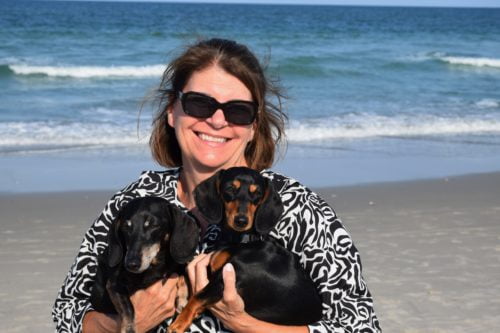
 It's National Pregnancy/ Child Loss Month. And I have been invited to guest blog over at Project Pomegranate for the next several weeks about my experiences and writing #Birthed. Recently I offered this post that I'd like to also share with you today:
It's National Pregnancy/ Child Loss Month. And I have been invited to guest blog over at Project Pomegranate for the next several weeks about my experiences and writing #Birthed. Recently I offered this post that I'd like to also share with you today:
Since folks have heard that I wrote a memoir about my struggle with infertility, many ask: “How could you write something so painful, so personal?”
The answer I give is “How could I not?”
When my husband, Kevin and I were in the throes (and I really mean the throes) of our deepest pain of miscarriage and failed fertility treatments in 2009, I searched and searched for resources.
Not being the type of person who liked support groups and avid reader . . .
I looked for comfort in books because I could read books at home without having to go anywhere or talk to anyone about my infertility (and at my privacy was a key at that time). In the books I kept buying (and buying) from Amazon each week, I craved good, honest stories like:
I wanted someone to tell me what it felt like to visit the doctor every single morning at 7:30 am.
I wanted someone to tell me what it felt like hear via email that one of your best friends is pregnant the 3rd time without really trying (sigh).
Or, to find that an IVF cycle didn’t work for the 4th time as savings accounts sat drained.
For, when these things happened to me, I crumbled and crumbled hard. Many weeks I didn’t get out of my pajamas for days and some nights I drank too much too. I felt shame for not being able to cope with the loss appropriately (as if not being able to carry a baby successfully was a failure enough!)
Yet most of the books I read at that time fell into one of two categories (in my opinion).
To my frustration, neither of these approaches seemed congruent with our experiences.
They left me feeling judged for my choices and often feeling more isolated. While sure, it was nice to find solidarity with those who had walked in similar shoes, I hated getting to the end of the book only feeling like there’d been little to no movement on the part of the author.
I wanted a deeper, more reflective memoir.
I wanted someone to tell me how they found God in the mess of so much loss and so much pain.
I wanted to know how I could move from the angry and obsessive cries of “must have baby now” to “there’s hope for me no matter what.” I wanted to know that God hadn’t forgotten me and was just as loved as my “with child” friends.
So, when I sat down to begin to tell our story in Birthed: Finding Grace Through Infertility (which will be released by Chalice Press on December 6th) . . .
I sought to create the memoir I was looking for but never found: a story of hope, a story of wrestling with God, and a story of moving toward healing even when our journey kept not turning out like we expected.
I can’t wait for you to read it and tell me what you think.
If you live in West Virginia, Oklahoma or North Carolina I am coming to you soon. Visit my schedule page to learn more.
Let me let you in on a secret. I may seem cool and calm in person. But, when I'm launching something new, I'm a nervous wreck on the inside. For there's nothing scarier than putting yourself out there, putting all your energy or weight behind something and hoping people show up, participate and gain from the experience what you hoped they would.
I believe such fear is a normal part of the world of church ministry.
Pastors are often the movers and shakers of the church, aren't they?
We are the ones who start new things. We are the ones who say to other church leaders: "Trust me. We just need to do this." We are the ones who often plan the sermon series that ruffles some feathers.
And so every Advent or Lent when I've offered a new book study or worship series . . .
Or, every summer that I've thrown out the normal worship practices in exchange for a Sabbatical of sorts . . .
Or every church council meeting, I've offered a new way of thinking about church leadership . . .
I've had a pit in my stomach. That pit that reflects back: "What if ___ is a terrible idea? What is no one shows up? What if I'm the only one who really cares about ____?"
Of course, I could listen to the fear and stop all plans. But, I'm a firm believer that we can't let fear control us, can we? So, with my brave face on, I've set out chairs. I've make flyers. I've invited people to a meeting.
And when all is said and done, usually I'm delightfully surprised.
All is usually well. Or at least I get through the experience (so I can cry about its failure alone at home).
Life is lived well when we put our ideas, our heart on the line, isn't it?
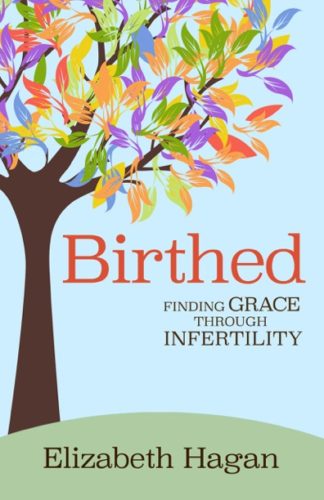 I'm soon offering the world something new, something I've been working on for a long time. Birthed: Finding Grace Through Infertility will soon be available for sale. And I have a PIT in my stomach about it too.
I'm soon offering the world something new, something I've been working on for a long time. Birthed: Finding Grace Through Infertility will soon be available for sale. And I have a PIT in my stomach about it too.
Though I know it's the best writing I could offer readers at the moment it went to print. . .
Though I know it was a writing project God called me to complete . . .
Though I know it has the potential to help readers who've walked through a similar season of pain find hope . .
I'm scared.
And there's part of me that wants to hide out and not come out till the book launch is over.
Because I want you to like it (and I know not everyone will).
Because I want to keep doing this kind of work: living stories, writing stories and sharing them with you (and the number of copies sold of Birthed will have a lot to say about whether or not I can easily keep doing this).
Because my heart is on every page (and it feels so vulnerable to offer the ENTIRE public my heart).
But, my prayer is MAY NOT MY FEAR HOLD ME BACK.
So in faith, I've spent the past weeks planning, organizing and dreaming about book launch events trusting that some of you might want to come. And hoping these events will help me get this book in the hands of those who need it the most.
For the truth is this: the only job I have is to trust the Spirit-- the Spirit who nudged me long ago to write this-- will help Birthed be what it needs to be. All will be well. It really will!
And would you like to read a preview? Head over to my publisher's website, Chalice Press and read what some earlier readers have to say about it and one chapter! Thanks, friends, for being along for the ride.
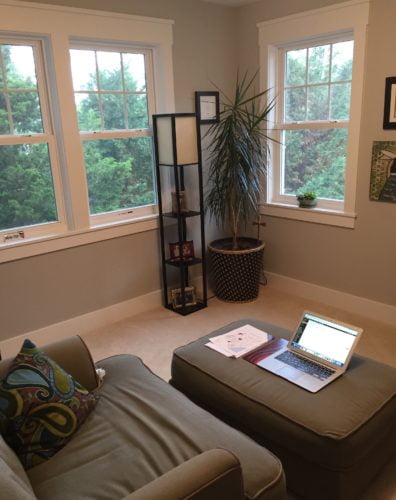 What am I up to these days? Writing, writing and more writing!
What am I up to these days? Writing, writing and more writing!
My publication date of this memoir project is only months away now. And we have title! Watch for Birthed: Finding Grace Through Infertility coming October 2016! The planning stage for marketing is in full force now, and it's excited to see the years of working on this coming together.
And just like parents who've birthed their first child, people are already asking me what about another? Am I going to write a second book?
And the answer is YES! (I hope).
I've got an idea brewing in me related to orphan care and already some fire in me that's got me drafting like crazy these past couple of weeks.
Being at the starting gate again is frightening (like I've never written a word in my life), comforting (like hey I did this once and survived so maybe I could do it again) and equally annoying (like oh, my goodness I'm going to go through this LONG writing and re-writing process over and over. What am I thinking?).
Thanks to a wonderful workshop sponsored by the great folks at Collegeville Institute and Austin Presbyterian Seminary that I attended a couple of weeks ago, my drafting of late has come with these questions on my mind.
But, most of all I think a lot about what makes writing good?
Like most writers, I always have the fear in the back of my head that says, "What if I am not good enough at this? What if what I put together flops? (Especially since I have no idea if you liked the first book yet . . . )"
In my fears, though, I know I'm not alone. Because the more I have conversations with those of you who are considering writing for the first time, you tell me: "Who am I to think that anything of my life would be interesting to someone else?"
I want to say this because I believe we as artists (musicians, painters, dancers, gardeners, etc.) waste so much time that we could spend producing JUDGING ourselves. And in this, the world misses out on the best contributions we might have to offer. (A great book by Elizabeth Gilbert has a lot to say about this which I highly recommend).
The more I sit with the question of makes writing good (or any creative offering for that matter) my opinion is this: good writing tells the truth. Good writing offers a piece of our common story of being on planet earth as a human being that we all can relate to.
Sure, in the writing world, grammar and proper use of metaphors within a chapter are important but "good writing" is not all about technical details, I told a young friend recently.
I read a lot. And I can usually tell pretty quickly if I am going to stick with a book or discard it from the pile of books on my nightstand or in my Kindle. For I'm easily annoyed by writers who try to sound like someone else. Or are so full of ego or lost in fantasy that they don't admit what is really troubling them.
You see, the thing is like you, I love stories. I love stories that make me feel less alone. I love wise stories that speak wisdom on the page that I'm not ready to say aloud, but want to. I love stories that give me new insight into those I think I hate, and stories that leave me convicted about how little I know.
This is why I have the words BE BRAVE on the home screen of my computer. I look at them every day.
So what is it like writing a memoir? It's growing comfortable telling the truth-- the best you can.
